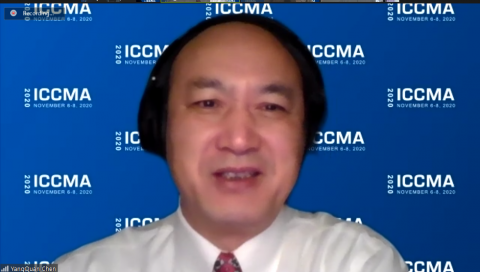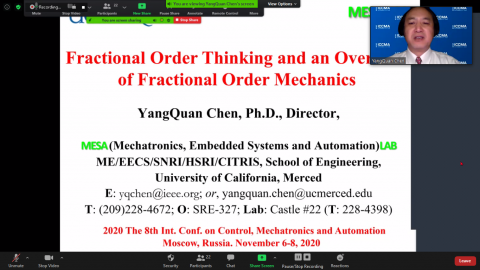Professor Chen gave a keynote lecture at The 8th International Conference on Control, Mechatronics and Automation (online, was planned to be held in Moscow, Russia on November 6-8, 2020.). [Conference schedule]
Title: "Fractional Order Thinking and an Overview of Fractional Order Mechanics" [PPT slides] [Keynote certificate]
Abstract: In this talk, I will introduce the basic idea of fractional calculus (differentiation or integration of non-integer orders) and its connections to almost all aspects of modern sciences and engineering when the phenomena or the system is complex. Therefore, I advocate the so called “Fractional Order Thinking (FOT)” and explain when we should use FOT. In particular, I will suggest an interpretation of fractional order derivative by referring to Newton’s fluxions as well as non-local models. Then I will make a brief introduction to what I am teaching in Fall 2020 semester “Fractional Order Mechanics” with basic topics covered and an overview of labs I designed for this course. The overall course can be interpreted as the physical interpretation of fractional calculus.
Biography: YangQuan Chen earned his Ph.D. from Nanyang Technological University, Singapore, in 1998. He had been a faculty of Electrical Engineering at Utah State University (USU) from 2000-12. He joined the School of Engineering, University of California, Merced (UCM) in summer 2012 teaching “Mechatronics”, “Engineering Service Learning” and “Unmanned Aerial Systems” for undergraduates; “Fractional Order Mechanics”, “Linear Multivariable Control”, “Nonlinear Controls” and “Advanced Controls: Optimality and Robustness” for graduates. His research interests include mechatronics for sustainability, cognitive process control (smart control engineering enabled by digital twins), small multi-UAV based cooperative multi-spectral “personal remote sensing”, applied fractional calculus in controls, modeling and complex signal processing; distributed measurement and control of distributed parameter systems with mobile actuator and sensor networks. He received Research of the Year awards from USU (2012) and UCM (2020), respectively. He was listed in Highly Cited Researchers by Clarivate Analytics in 2018, 2019 and 2020. His lab website is http://mechatronics.ucmerced.edu/ and his publications are at https://scholar.google.com/citations?user=RDEIRbcAAAAJ&hl=en
Recorded talk (coming soon)
Also in 2019 ICCMA in TU Delft, Prof. Chen gave a (in person) plenary talk on "Greener Process/Motion Control Using Fractional Calculus" (Youtube recroded videl link is here)
Abstract: By fractional calculus we mean that the order of differentiation/integration can be non-integer. Denying fractional calculus is like saying that there is no nonintegers in between integers. For control engineers, the fundamental question is: Can the fractional order controller really outperform its integer order counterparts under fairness consideration? We will show that fractional order proportional derivative and integral controllers (FOPID) indeed outperform integer order PID controllers (IOPID) under fairness comparison for first order plus time-delay (FOPTD) plants. It is now being accepted that the additional freedom in tuning the FOPIDs can offer a good potential to achieve better performance at the cost of extra implementation efforts. Since the embedded computing power and memory are both getting cheaper and cheaper, people are running out of excuses not to attempt FOPID in industry 4.0 era when more optimal performance is being pursued. FOPID can do better than the best of its integer order counterpart under fairness comparisons in terms of performance, robustness margins and even control energy consumption. We then focus on the energy consumption of control efforts and we make a convincing case that it is possible to achieve greener process/motion control using fractional calculus that has huge implications in many industry sectors. Youtube recroded videl link is here



Created and last updated by Prof. YangQuan Chen 11/16/2020.



